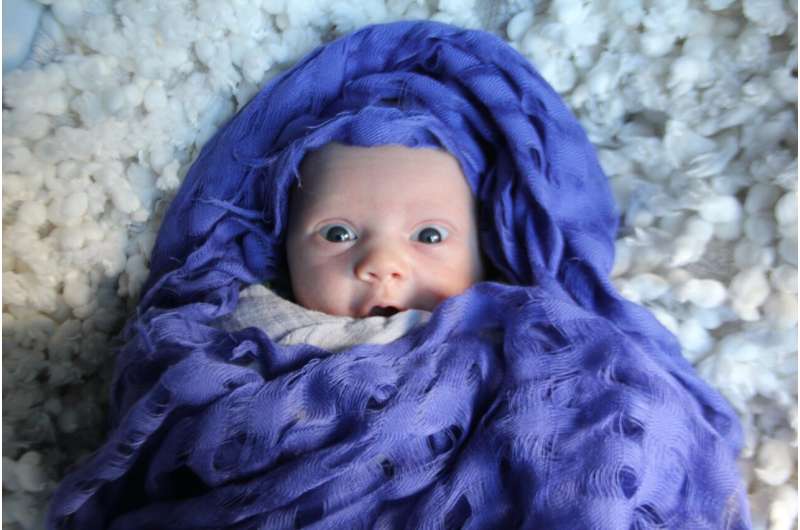#Why are child cases of RSV surging in the wake of COVID?

“#Why are child cases of RSV surging in the wake of COVID?”

Hospitals in the UK are seeing a rise in children suffering from severe respiratory infections. This includes an unseasonal surge in an infection called the respiratory syncytial virus (RSV), in children as young as two months old. It has resulted in growing numbers of hospital admissions for bronchiolitis, a lung inflammation similar to bronchitis.
So why is RSV, considered a winter illness, peaking in the summer of 2021? Simply put, restrictions put in place for preventing the spread of COVID-19 held back other respiratory viruses too. As many countries are lifting these restrictions, many respiratory diseases are spreading again.
RSV is a common respiratory pathogen—so common in fact that nearly all of us are infected with it by the age of two. For the vast majority of people, this virus causes a mild disease resembling a heavy cold, with runny nose and cough. These symptoms normally resolve without treatment within a week or two.
However, in approximately one in three children, RSV can cause bronchiolitis, an inflammation of the bronchioles, the smallest tubes in our lungs. This restricts the airways, and patients experience raised temperatures and difficulty breathing, often making a wheezing sound when drawing air.
While bronchiolitis can often be dealt with without much more than fluids and paracetamol, it can sometimes develop into a serious illness. If a young person’s breathing becomes severely restricted, symptoms can worsen, causing temperatures over 38C, blue lips and increased difficulty breathing.
In young children, this may result in refusing feeds and dry nappies for long periods. This is when many parents rightly make the decision to take their child to hospital. Very young children—those in their first months of life—are the most susceptible to hospitalization due to having smaller airways.
While most cases can be controlled, bronchiolitis is sometimes fatal. Approximately 3.5 million children globally each year are hospitalized, with around 5% of these cases sadly resulting in death.
Delayed surge
It would appear that COVID responses like increased hand washing, mask wearing, and reducing close contact between people led to a greatly diminished flu season in winter 2020-21. The same was true for RSV, with studies reporting 84% fewer hospitalization due to bronchiolitis in northern hemisphere countries than in previous years. Dramatic reductions were also noted in Australia. Now the opposite is happening, affecting a whole year of newborns who won’t have encountered many respiratory viruses while restrictions were in place.
We don’t know why some children infected with RSV experience mild symptoms and others fall gravely ill. Many risk factors associated with severe RSV illness have been identified, including age (one-month-olds are at highest risk), gender (males are statistically more at risk than females), environmental factors like smoke exposure, underlying lung diseases, and some genetic factors.
Despite this knowledge, it is still not possible to definitively identify which children will develop bronchiolitis. However, in some countries, individuals are identified as high-risk through these known risk factors and are given prophylactic treatments.
As with all infectious agents, a robust immune response is key to clearing the infection. We know that high quantities of neutralizing antibodies (including maternal antibodies and antibody treatments such as palivizumab) are protective of severe illness. Yet immunity to RSV isn’t complete or particularly long-lasting, as most of us are reinfected throughout our lifetimes. This is part of the reason why, despite monumental efforts from many research groups, there are no vaccines currently available.
In addition, our immune systems can sometimes cause damage to our bodies when attempting to clear an infection. With RSV, certain immune responses have been shown to enhance disease severity and have been linked to the development of asthma. Due to the widespread nature of both RSV and asthma in the UK, the connection between the two is widely studied, including in the Wellcome Trust-funded Breathing Together project on which I am currently working.
Any treatment or vaccine for RSV has to tread a fine line of being beneficial in terms of clearing the infection but without producing negative effects. Mistakes have been made in the past, with previous attempts at an RSV vaccine in the 1960s resulting in children falling severely ill.
But with RSV immunity being far better researched and understood now, vaccines are at least in development. Several are currently in clinical trials in the hope that we can finally protect all children from RSV-induced bronchiolitis.
Pediatricians, seeing spike in RSV cases, urge parents to look out for symptoms
This article is republished from The Conversation under a Creative Commons license. Read the original article.![]()
Citation:
Why are child cases of RSV surging in the wake of COVID? (2021, July 29)
retrieved 29 July 2021
from https://medicalxpress.com/news/2021-07-child-cases-rsv-surging-covid.html
This document is subject to copyright. Apart from any fair dealing for the purpose of private study or research, no
part may be reproduced without the written permission. The content is provided for information purposes only.
If you liked the article, do not forget to share it with your friends. Follow us on Google News too, click on the star and choose us from your favorites.
For forums sites go to Forum.BuradaBiliyorum.Com
If you want to read more Like this articles, you can visit our Science category.



